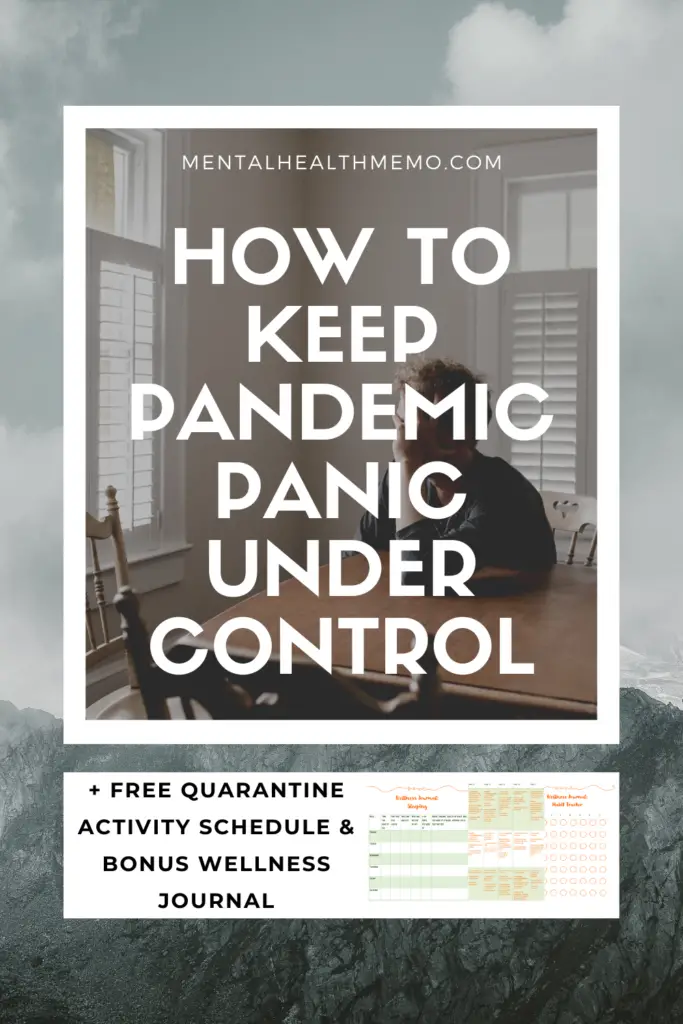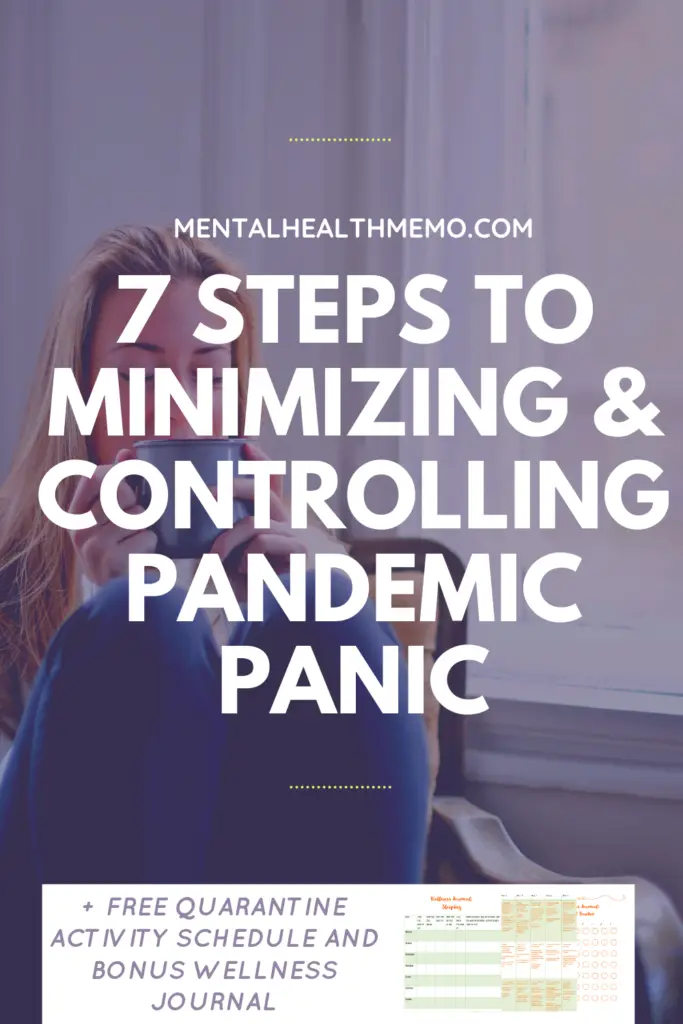Table of Contents
What is Pandemic Panic?
During a pandemic, it makes sense to start panicking about how you’ll survive, whether you have the means to, and what’ll happen in the future. And being alert and alarmed is alright and a natural survival instinct for humans during an emergency.
Pandemic panic might feel like:
- loss or increase in appetite
- fatigue
- difficulty sleeping
- increased heart rate
- inability to settle
- feelings of stress
And again, this is normal for a situation like a pandemic. As humans, we’re geared to survive so this is our fight, flight, or freeze instinct.
However, it’s not healthy to maintain that level of stress for a long period of time, especially if it’s unnecessary. So, in this article, I wanted to share with you how to not fall into a panic during a pandemic, and how to take care of your wellbeing. Let’s jump in!

1. Evaluate What you Already Have
Before freaking out about supplies and going on a panic shopping spree, first, start by evaluating what you already have. This includes food, toiletries, medication, hygienic products, clothing and everything else in between. By first looking at what you already have, you do two things:
1. You ensure that you are not buying things you don’t need. This will save you money, time spent in busy stores, and prevent waste of supplies. That last point is incredibly important because if we all went out buying everything we see even if we don’t need it, we’ll soon run out of supplies for everyone.
On top of that, that last box of crackers you have never eaten before but bought because you were panicking could have been considered an essential item to somebody else. So, by checking what you already have and actually need, you are benefiting yourself AND others. You are also preventing yourself from panicking over what you need to buy.
2. By looking through what you already have, you may find that you actually already have a lot of supplies and you aren’t in need of anything aside from groceries and a few extra things.
This will again prevent you from panic shopping, but it will also act as a sense of relief as you’re already well prepared. Especially if you can’t access a grocery store for a while, knowing you’re at least relatively stocked will really help to prevent you from panicking.
Now that you know what you already have, it’s time to get to the next step.
2. Creating a Plan
Once you’ve established what you have in preparation for the pandemic, it’s time to create a plan for what you don’t have but need, and how to obtain it.

Having a plan will really help prevent you from panicking because often as humans we feel panicked when we feel lost or out of control. Creating a plan and figuring out how to execute it can help you to feel in control and thus, calmer.
Create a list of everything you need, and where you can get these items from. Ideally, you want to save yourself from going to busy stores and encountering people.
So, research what you can order online and which local stores around you have side curb pick-up or delivery options you can utilize to minimize risk.
As some items are much more in demand than others such as toilet paper and non-perishables, call stores in advance to ensure they have everything you need before going to again, minimize your risk.
Being prepared in this way is going to make you feel much more in control during these unpredictable times and will help you to not panic. If there’s a plan, there’s a way!
3. Check for Available Supports
With many people losing their jobs and thus their income, panic about financing our livelihoods can become overwhelming. This can include rent, food, heating, electricity, phone bills, taxes, and everything else we have to pay for on the regular.
Panicking about something like this is completely serious and warranted, as our survival depends on it. It would be inappropriate to- in these circumstances- suggest something like self-care, exercise, or painting to ease your panic. Instead, in these situations, external support is needed.
At this point, most governments have put in measures to support citizens during this pandemic. This can include:
- Employment insurance
- Emergency funds
- Food support services
- Policies forbidding landlords to kick people out because they can’t pay rent
- Schools are offering funds to students
- Emergency housing
- And much more
So depending on what your needs are, you can look into what has been put in place legally through your government and other social service providers, and reach out for help.
Finding resources that will help you survive and knowing there is support being offered for people in your circumstance will hopefully offer you some emotional relief. This sense of stability will then lower your panic.
4. Create a Consistent Routine
Having a routine during a pandemic can make a world of a difference for your stress levels. As mentioned, we tend to get panicky and stressed when we feel things are out of our control. This feeling can be exaggerated even more when we’re taken out of our normal routines and quarantined.
Creating a quarantined routine will help you to feel like you have consistency within chaos and uncertainty. Holding onto this consistency will lower your panic, and improve your mood.
What kind of routine you should follow depends entirely on you, your needs, and your current circumstances. If setting a routine is hard because your work is inconsistent, or you’re taking care of family, or you’re simply feeling really impacted by the pandemic, try to incorporate a routine in small ways. For example
- Waking up and going to bed at relatively the same time
- Having a set “get ready for sleep” routine in place that can be as simple as washing your face, brushing your teeth and reading before going to bed
- Trying to maintain hygienic habits every day
- Having a consistent TV show to watch
- Eating at similar times throughout the day
- Etc!
By incorporating even tiny consistent habits, you’ll feel calmer and more in control. This will then improve your overall wellbeing during the pandemic!

5. Find a Way to Have Fun!
Doing something new and exciting every day can be an incredible way to forget about what’s happening outside and destress. This is easier said than done, so I’ve created a 3-week quarantine activity schedule you can sign up for and access below!
Each day has a few different activities you can do, ranging from exercises, cooking ideas, random skill-learning, crafts, meditations, to fun videos to watch and much more. This schedule is going to make getting through your quarantine a hundred times more fun, which will, in turn, help you stay happy, stress-free, and healthy!
I’ve also included my wellness journal as a bonus, to really help you stay in control of your wellbeing during this pandemic. The journal is all-encompassing and covers your daily eating, exercise, sleep, mood and engages you in weekly reflections to ensure you are taking care of all aspects of your health. You can continue to use it even after the quarantine!
6. Practicing Mindfulness
During a pandemic, we’re going to be worrying and thinking about the future, and we’re going to be reminiscing about the past. However, getting stuck in the past and future is only going to increase our stress levels. It’s important to instead focus on the present moment. And you can do this by practicing mindfulness.
If you’re unfamiliar, mindfulness is simply the act of being in the present and accepting it for what it is. You can practice mindfulness in many ways:
- Guided mindfulness exercises (you can look these up and find ones you like)
- Meditations (I have included a handful on my calendar)
- Eating mindfully
- Doing body scans
- Utilizing breathing techniques
- Doing art activities (such as colouring, painting, knitting etc)
- You can even do something as simple as pausing and simply noticing how you’re feeling and what’s around you
These are just some ideas for practicing mindfulness, but there are many more. Focusing on the present rather than any other time is going to help you to not panic, as you’re not getting caught up in past or future problems. You’re simply being in the moment.
7. Take a Break From the News

Staying informed is incredibly important. However, if you’re constantly listening to the news about COVID-19 all day long, you’re simply putting yourself through a constant state of panic and anxiety. Being in that state for a long period of time is going to put you at risk for health issues, chronic anxiety, trauma, depression, and much more.
Instead, update yourself on what’s going on and then TAKE A BREAK. Turn off all the news and focus on something else. Allowing yourself time away from the pandemic is going to let you relax, reground, de-stress and have a mental break. This is incredibly important for your wellbeing.
In Sum
Facing a pandemic is incredibly traumatizing, draining, difficult, and anxiety-inducing. Please know that you are allowed to feel distraught, scared, and unable to participate in life the way you normally would. I hope you use these tips to hopefully reduce your anxiety, and improve your wellbeing during these hard times.
If you’d like even more support on how to deal with the situation, you can check out my other article on How to Make the Best of Your Quarantine in 6 Simple Steps. I go over some additional strategies there on how to enjoy your quarantine as best as you can.
Stay safe, stay healthy, and be kind to each other!
All my love,
T

